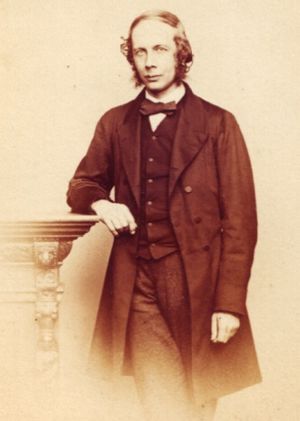Henry James Sumner Maine facts for kids
Quick facts for kids
Sir Henry Maine
|
|
|---|---|

The young Maine
|
|
| Born | 15 August 1822 Kelso, Scotland, UK
|
| Died | 3 February 1888 (aged 65) |
| Alma mater | Pembroke College, Cambridge |
| Scientific career | |
| Fields | History, Law |
| Institutions | University of Oxford University of Cambridge University of Calcutta |
| Signature | |
Sir Henry James Sumner Maine (born August 15, 1822 – died February 3, 1888) was an important British historian and expert in law. He studied how laws and societies change over time.
Maine is famous for his idea that laws and societies developed "from status to contract." This idea is explained in his book Ancient Law. He believed that in ancient times, people's lives were mostly decided by their birth or social group. For example, if you were born into a certain family, your job and place in society were already set.
However, in modern times, people are seen as free individuals. They can choose their own jobs, make agreements (contracts), and join groups based on their own choices. Maine's ideas helped create new fields of study like legal history and the sociology of law, which look at how laws and societies are connected.
Contents
Early Life and Education
Henry Maine was born in Kelso, Scotland. He went to a school called Christ's Hospital. Later, in 1840, he attended Pembroke College, Cambridge, a famous university.
At Cambridge, Henry was known for being very good at studying ancient languages and cultures. He won a special award for poetry in 1842. He also graduated at the top of his class in 1844.
After finishing his studies, he became a teacher at Trinity Hall. In 1847, he was made a professor of Civil Law at Cambridge. He also became a lawyer three years later.
Work in India
In 1862, Henry Maine was asked to work as a legal advisor in India. At first, he said no because of his health. But he was later convinced to accept the job. It turned out that India suited him well.
He stayed in India for seven years, longer than planned. His job was to give advice to the government on many important issues. These included how land was owned in the Punjab and how to introduce civil marriage for some groups.
Maine also helped create new laws for India. These laws were later put into action by other legal experts. After returning to England in 1869, he continued to advise the government on Indian affairs.
Professor at Oxford and Cambridge
In 1869, Henry Maine became a professor at the University of Oxford. He taught about the history of law and how laws compare across different societies. He did not have to live in Oxford all the time. This allowed him to continue the important work he started with his book Ancient Law.
Later, in 1877, he became the head of Trinity Hall, Cambridge, where he had taught before. This meant he had to leave his job at Oxford. Ten years later, he also became a professor of International Law at Cambridge.
Later Life and Death
Henry Maine was not always in good health. Towards the end of 1887, his health got worse. He traveled to France for medical advice. He passed away in Cannes, France, on February 3, 1888. He left behind his wife, Jane, and two sons.
Main Works and Ideas
Henry Maine wrote for newspapers and magazines early in his career. He even helped start a magazine called the Saturday Review.
His most famous book, Ancient Law, was published in 1861. In this book, he explored the earliest ideas of humankind as seen in ancient laws. He also showed how these old ideas relate to modern thinking.
He also published other important books based on his lectures:
- Village Communities in the East and the West (1871)
- Early History of Institutions (1875)
- Early Law and Custom (1883)
In these books, Maine looked at how societies developed their legal and political ideas over time. He studied how ancient communities worked and how their rules changed.
As the leader of the University of Calcutta in India, Maine also thought about how Eastern and Western ideas mixed. He wrote about this in some of his speeches.
His last book, International Law (1888), was published after he died. He also wrote a book called Popular Government (1885). In this book, he discussed how different types of governments work, including democracy. He argued that democracy is not always more stable than other forms of government.
Selected Publications
- Ancient Law: Its Connection with the Early History of Society, and Its Relation to Modern Ideas. London: John Murray, 1861.
- Village-Communities in the East and West. London: John Murray, 1871.
- Lectures on the Early History of Institutions. New York: Henry Holt and Company, 1875.
- Dissertations on Early Law and Custom: Chiefly Selected from Lectures Delivered at Oxford. London: John Murray, 1883.
- Popular Government: Four Essays. London: John Murray, 1885.
- International Law: A Series of Lectures Delivered Before the University of Cambridge, 1887. London: John Murray, 1888.
Images for kids
-
Maine, sitting second from right, with John Lawrence, Viceroy of India and other council members and secretaries in Simla, India, by Bourne & Shepherd, circa 1864.
 | Stephanie Wilson |
 | Charles Bolden |
 | Ronald McNair |
 | Frederick D. Gregory |



